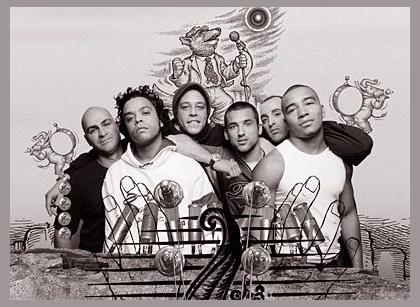 Da Weasel
Da Weasel
Da Weasel: A Portuguese Hip-Hop Odyssey
Humble Beginnings and Early Success
Da Weasel emerged from the vibrant Lisbon underground music scene in the mid-1990s. The group, consisting of Carlão (vocals), João Nobre (DJ), Virgul (DJ), and Jay Jay (bass), quickly gained attention for their innovative fusion of hip-hop, funk, and Portuguese lyricism. Their 1993 debut album, "More Than 30 Motherf*s," catapulted them into the spotlight, establishing them as pioneers of Portuguese hip-hop.
Challenges and Controversies
Throughout their career, Da Weasel faced various challenges. Their music often provoked controversy due to its explicit lyrics and social commentary. Carlão's outspoken nature and the group's willingness to tackle sensitive topics attracted both criticism and admiration. However, their unwavering commitment to artistic integrity and their dedication to their fans allowed them to navigate these obstacles.
Discography and Notable Songs
Da Weasel released a string of critically acclaimed albums, each showcasing their eclectic sound and lyrical prowess. Their 1994 album, "Dou-te a Lua," spawned the hit single "Re-Tratamento," which became an anthem for a generation. Other notable songs include "Todilão," "O Problema É," and "Dialectos de Ternura."
Members and Collaborations
Over the years, Da Weasel's lineup underwent several changes. João Nobre left the group in 2004, followed by Jay Jay in 2009. However, Carlão and Virgul remained at the core of the band, collaborating with a variety of guest artists. Notable collaborations include "Podes Fugir Mas Não Te Podes Esconder" with Sam the Kid and "Ai Amor" with Ana Moura.
Legacy and Impact
Da Weasel's pioneering contributions to Portuguese hip-hop have left an enduring legacy. Their music continues to inspire and resonate with audiences, solidifying their status as one of the most influential Portuguese bands of all time. Their ability to blend musical genres, address social issues, and connect with their fans has cemented their place in the annals of Portuguese music history.
Humble Beginnings and Early Success
Da Weasel emerged from the vibrant Lisbon underground music scene in the mid-1990s. The group, consisting of Carlão (vocals), João Nobre (DJ), Virgul (DJ), and Jay Jay (bass), quickly gained attention for their innovative fusion of hip-hop, funk, and Portuguese lyricism. Their 1993 debut album, "More Than 30 Motherf*s," catapulted them into the spotlight, establishing them as pioneers of Portuguese hip-hop.
Challenges and Controversies
Throughout their career, Da Weasel faced various challenges. Their music often provoked controversy due to its explicit lyrics and social commentary. Carlão's outspoken nature and the group's willingness to tackle sensitive topics attracted both criticism and admiration. However, their unwavering commitment to artistic integrity and their dedication to their fans allowed them to navigate these obstacles.
Discography and Notable Songs
Da Weasel released a string of critically acclaimed albums, each showcasing their eclectic sound and lyrical prowess. Their 1994 album, "Dou-te a Lua," spawned the hit single "Re-Tratamento," which became an anthem for a generation. Other notable songs include "Todilão," "O Problema É," and "Dialectos de Ternura."
Members and Collaborations
Over the years, Da Weasel's lineup underwent several changes. João Nobre left the group in 2004, followed by Jay Jay in 2009. However, Carlão and Virgul remained at the core of the band, collaborating with a variety of guest artists. Notable collaborations include "Podes Fugir Mas Não Te Podes Esconder" with Sam the Kid and "Ai Amor" with Ana Moura.
Legacy and Impact
Da Weasel's pioneering contributions to Portuguese hip-hop have left an enduring legacy. Their music continues to inspire and resonate with audiences, solidifying their status as one of the most influential Portuguese bands of all time. Their ability to blend musical genres, address social issues, and connect with their fans has cemented their place in the annals of Portuguese music history.